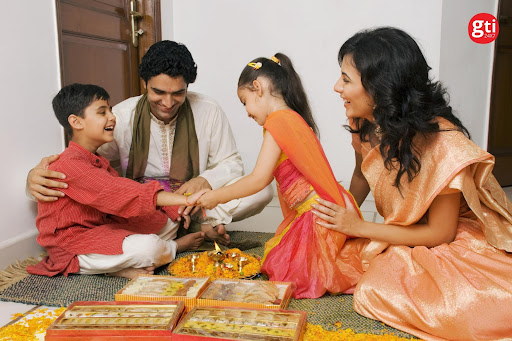
Introduction:
Raksha Bandhan, also known as Rakhi, is a cherished festival that celebrates the bond of love between siblings. It is an ancient tradition that holds great significance in Indian culture. In this article, we will delve into the fascinating history of Rakhi, tracing its origins and exploring how it has evolved over the centuries. From its historical roots to its modern-day celebration, let us unravel the story behind this timeless festival of love and protection.
1. Ancient Origins: The Roots of Rakhi
Rakhi has its roots in ancient Indian history and mythology. The festival dates back thousands of years and has been mentioned in various scriptures and epics. One popular story revolves around the bond between Lord Krishna and Draupadi, the wife of the Pandavas. When Draupadi tore a piece of her saree to bandage Krishna’s bleeding finger, he promised to protect her in return. This incident is often cited as the earliest instance of the Rakhi tradition.
2. Historical Significance: Rakhi in the Medieval Era
During the medieval era, Rakhi took on a broader significance beyond sibling relationships. It became a symbol of protection and a way to forge alliances. Queens and noblewomen would send Rakhis to neighboring kings and warriors, seeking their support and assurance of safety. This practice helped build strong bonds and fostered unity among kingdoms.
3. Rakhi in Indian History: The Story of Rani Karnavati
The historical significance of Rakhi is exemplified by the story of Rani Karnavati of Mewar. In the 16th century, she sent a Rakhi to Emperor Humayun, seeking his help in defending her kingdom against invasion. Touched by her gesture, Humayun immediately responded and came to her aid. Although he arrived late, his intention to protect her was evident. This incident showcases the power of Rakhi in fostering loyalty and brotherhood.
4. Rakhi in Modern Times: Reinforcing Sibling Bonds
In the present day, Rakhi has evolved into a celebration of sibling love and protection. Brothers and sisters exchange Rakhis, gifts, and heartfelt wishes. The tying of the Rakhi thread symbolizes the sister’s love and care for her brother, while the brother pledges to protect and support his sister throughout her life. Rakhi is a time for families to come together, strengthen their bonds, and create lasting memories.
5. Rakhi Traditions and Customs: A Festive Affair
Rakhi is not just about tying a thread; it is a celebration filled with traditions and customs. Sisters prepare elaborate Rakhi thalis with Rakhis, sweets, rice, and diya (oil lamp). The ceremony begins with prayers and the sister performing aarti (a ritual of waving a lit diya) around her brother. She then ties the Rakhi on her brother’s wrist, symbolizing the bond of protection. The brother, in turn, showers his sister with blessings and gifts.
6. Rakhi Celebration across India: Regional Variations
Rakhi is celebrated with great enthusiasm and fervor throughout India, albeit with regional variations. In some regions, sisters tie a Rakhi not only to their brothers but also to cousins, friends, and even plants and trees, symbolizing the broader concept of universal love and protection. The festival transcends religious boundaries, with people of different faiths coming together to celebrate the bond of Rakhi.
7. Rakhi in the Digital Age: Rakhi Delivery in India
With the advent of technology, the tradition of Rakhi has embraced the digital age. Sisters now have the option to send Rakhis to their brothers through online Rakhi delivery
services in India. This convenient option allows siblings to celebrate Rakhi even when they are geographically separated. Online platforms offer a wide range of Rakhis and gift options, making it easier than ever to express love and affection.
Conclusion:
Rakhi is a festival deeply rooted in history, mythology, and the essence of sibling love. It has withstood the test of time and continues to be celebrated with great joy and enthusiasm across India. The history of Rakhi showcases its significance in fostering relationships, promoting unity, and reinforcing the bond between siblings. Whether you celebrate Rakhi traditionally or opt for online Rakhi delivery in India, the essence of the festival remains the same – a celebration of love, protection, and the unbreakable bond between brothers and sisters.






